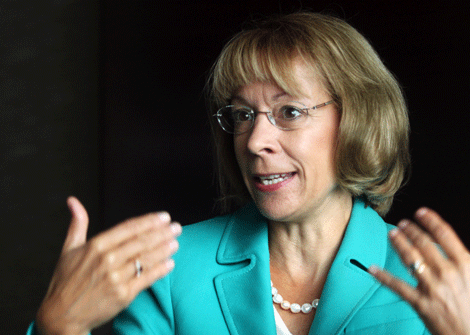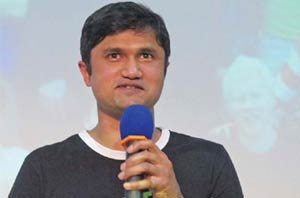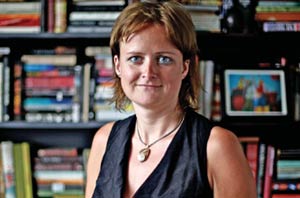On the information super highway
Updated: 2011-10-13 07:49
By Andrew Moody (China Daily)
|
|||||||||
|
Nancy McKinstry, chief executive officer of Netherlands-based publishing company Wolters Kluwer NV. [Liu Zhe / China Daily] |
|
 A visitor taking photographs of the book selection in the Netherlands Pavilion of the Beijing International Book Fair. Wolters Kluwer NV took part in the exhibition held in September. [Provided to China Daily] |
CEO sees China heading further into digital journal publishing while keeping printed word, Andrew Moody discovers.
BEIJING - Nancy McKinstry, head of one of the world's largest publishing organizations, believes China is rapidly advancing into the digital publishing age.
The 52-year-old is chief executive officer (CEO) of Wolters Kluwer NV, the Netherlands-based global publisher of information for professionals such as lawyers, accountants and those in healthcare.
"China is still primarily print-based but it is moving rapidly into the digital world, not just using online products but tablets and smartphones, as a way of accessing information," she said.
McKinstry, who was ranked by Forbes as one of the "100 Most Powerful Women in the World" and by the Financial Times in its top 50 "Women in the World" list, was in the Chinese capital in early September to attend the 18th Beijing International Book Fair, where she launched a number of publishing projects, including a deal with The Commercial Press in China to bring two Chinese legal books to an international audience.
"One of the things that we are working on with The Commercial Press and others is to jointly create content not just for the local market but very much to take that content, translate it into English and other languages and distribute it around the world," she said.
Wolters Kluwer had a turnover last year of 3.56 billion euros ($4.79 billion) and employs some 19,000 people worldwide in more than 40 countries.
 |
Its revenues in China grew by nearly 30 percent last year and the number of employees in the country has grown from just 30 five years ago to 230 today.
Professionals around the world subscribe to Wolters Kluwer's products to keep up to date with the latest information affecting their particular sector.
McKinstry said clients increasingly want this information in digital form either on their PC or on a mobile device.
"Our goal by the end of next year is to have 75 percent of our business online and 25 percent in print," she said.
"When I took over as CEO in 2003, it was exactly the reverse. You can see within this relatively short period of time this trend of moving to more digital information."
But she doesn't think that the book and printed information is about to die out in the near future.
"Do I think print will disappear, say, over the next decade? I would say 'No'. I think there is still a need to have something tangible in your hand so that you can look up information very quickly. A doctor standing by a patient's bedside will still want to pull out a drugs handbook to check what dosage they need to give," she said.
McKinstry, who is also on the board of telecommunications giant Ericsson and the Finnish media company Sanoma, insisted, however, that some of the new digital offerings are very exciting.
"What you can do in the tablet world now is really fascinating. You not only can provide text-based information but also video, graphs, charts and analytics. We have just launched a journal of neurology in tablet form in which one of the features is an expert in neurology coming out and talking about what an article means," she said.
McKinstry, who was born in Connecticut, does not come from a business background. She is the daughter of a single-mother teacher.
"I think that is one of the strengths of the American system. You can start from a very modest background, which I certainly did and, with a good education and hard work, you can develop into a strong professional," she said.
After taking a bachelor's degree in economics from the University of Rhode Island and securing a master of business administration from Columbia Business School in New York, McKinstry went to work for Booz Allen Hamilton (now Booz & Co) as a management consultant before moving into publishing.
After running the North American operations of Wolters Kluwer, she became its global CEO eight years ago.
She is the only female head of a major Dutch public company and one of very few in either Europe or North America.
She said the West is far behind China in promoting women, where there are many more high-profile women CEOs, particularly in the private sector. Wolters Kluwer is led in China by a woman - Chang Shasha, the China CEO.
"I think part of it has to do with society in China being very supportive of everyone working, so women have always participated in the economic growth of the country and they have always been an equal partner with men," she said.
McKinstry said the development of the company's business in China has been dramatic. When the company began operating in the country in 1985 there were no lawyers, one of the company's key customer bases, but now there are 170,000 and it is estimated there will be 2 million by 2020.
She said the small number of professionals in China meant it was always behind the company's other markets such as India, which has long had a strong legal sector.
"When you go back to 1985 there were no attorneys in China, while at the same time you always had strong professional sectors in the India market. I would actually say now that China is really far beyond the India market in terms of the infrastructure to support digital content and software products," she said.
McKinstry says she believes China is one of the most dynamic markets the company now operates in.
"One of the things we observe here in China is a very strong entrepreneurial spirit and work ethic, which are two factors which have allowed us to develop an attractive business here," she said.
The American is also impressed by the quality of modern Chinese management and the strength and depth of its workforce.
"I think the educational system in China is very good and what we see in our employees is a quest for knowledge. I would say the Chinese are culturally focused. They continue to develop their skills and to advance and that pays dividends in the business world," she said.
"Every visit I make here, I come away more and more appreciative of how fast the economy is developing here."
McKinstry said recent market turmoil makes it unclear whether the world economy is heading for a double-dip recession but adds that with 75 percent of the company's revenues derived from subscriptions the business is capable of riding short-term fluctuations.
"I think the jury is still out as to whether the recovery in the US we had been seeing throughout this year, until the last three or four weeks, will continue or whether the economic cycle will slow down a bit," she said.
"Our revenues are subscription driven so they tend to be quite resilient through the economic cycle but, of course, all businesses are affected by economic conditions."
McKinstry said she is impressed by the publishing industry in China and the increasing prominence of the Beijing International Book Fair.
"I have been astonished by how quickly the Beijing fair has been developing. I think it is now very much neck-and-neck with Frankfurt and certainly an important event for us," she said.
She believes China will quickly adapt to the digital publishing world and that in her company's business the technology will be a major timesaver for busy professionals deluged with information.
"If you are a doctor, the body of medical literature doubles every 10 years. There are not enough hours in the day to read all the stuff. Any software tools you can develop that help them deal with this information will prove vital."










